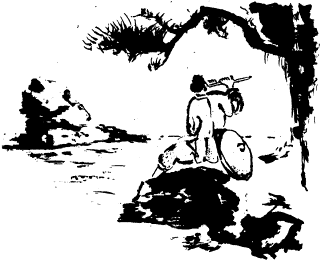
|
The Record of Water and Mirror Turning Back Heaven |
|
WHAT
IS THE ULTIMATE MEANING OF THE MIDDLE WAY? |
 |
"Ultimate" means final, "meaning" means what is fitting, "middle" means not going to extremes and "way" means practice. To discuss the concept of the middle further, if one does not go far enough he will not reach the goal. When he goes too far he should bring about a lessening, and when he falls short, he should increase. In either case he should avoid falling into emptiness, or grasping at existence. This is what is meant by the Middle Way, the true substance of the principle of True Emptiness. It is also called the Reality Mark, True Suchness, One’s Own Nature, and the Buddha-nature. |
|
To put it quite clearly once again, it is like the figure O which is the sole ancestor of heaven and earth, the father of all Buddhas, the mother of all things, and the source of the most subtle of wonders. Everything in life and death comes from it and there isn’t anything, which does not return to it. This is what is meant by the phrase "true Emptiness is not empty. Wonderful existence is not existence." One who understands this can be called a "man of the Way who is without a mind," one who has overstepped all categories, who has been released from the suffering of the wheel, one who roams freely at leisure, who has ended birth and death, a living dead man. PLEASURE IS THE CAUSE OF SUFFERING The Saha World is characterized by the blazing of ten thousand sufferings. It is full of a great many evils. There are many ways to suffer—three, eight, and limitless ways—but it is difficult to discuss them; they can never be fully described. The three sufferings are the suffering within suffering, the suffering of deterioration, and the suffering of notion. The eight sufferings are those of birth, aging, sickness, and death, as well as the suffering of being separated from objects of love, the suffering of encountering objects of hate, the suffering of not realizing aspirations, and the suffering of the raging of the five skandhas. Wearing beautiful new clothes is a great pleasure, but before long, the clothes become a yoke. When they get dirty or stained, worry arises. Would you call this pleasure or suffering? Fine eating is foremost among pleasures, and so hundreds of delicacies have been invented. Nonetheless, a gourmand can eat only three times a day; more brings on illness and diarrhea. Would you call this pleasure or suffering? Elegant estates are considered great pleasures. Although one may accumulate thousands of dwellings, during sleep his realm extends less than eight feet. All those houses need stewards, and caring exhausts one's mental faculties. Would you call this pleasure or suffering? A BURNING HOUSE WITHOUT PEACE The place where we live is forever disrupted by countless troubles. One day there are earthquakes, the next day landslides, and the next, tidal waves. All kinds of calamities follow one upon another endlessly which is why the ancients said, "The triple world knows no peace; it's like a burning house." After he left the home life the Great Master Lien Ch'ih often returned to visit his family. His wife, wise and wholesome, searched for a method to help him, and came up with the following means. Just inside the door she dug a pit. In it she set live coals. When the Master set foot inside the house, he stepped in the fire and let out a great yell, "Fire!" His wife replied, "Since you know it's a fiery pit, don't come back." The Master then had a great awakening. Later he became an outstanding personage in Buddhism. THE WAY OF FRATERNAL RELATIONS During the Han Dynasty, the family of a four-year-old boy named Kung Yung received a gift of a box of pears. All his brothers took large ones while Kung Yung deliberately sought out the smallest. Surprised, his elders asked the boy about his behavior. "My brothers are older than I and they should get the big ones. Since I am the youngest it is fitting that I receive the smallest," he replied. Although Kung Yung was young, he had a profound understanding of the principles of yielding and filial respect. More of such behavior would truly influence the world. THIS SERIES WILL BE CONCLUDED WITH THE NEXT INSTALLMENT |